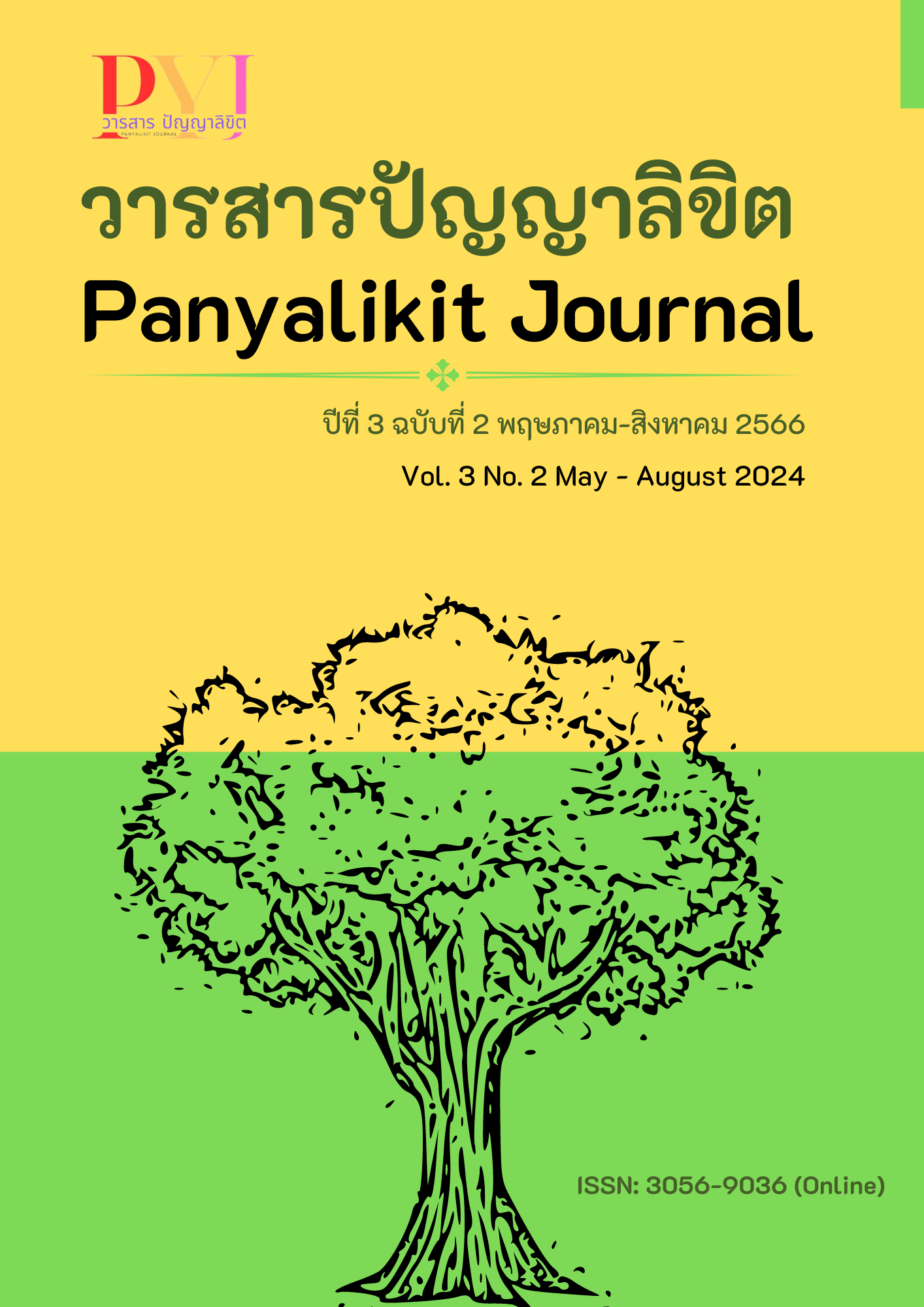พลังแห่งสติ: การรับมือกับความไม่แน่นอนในสังคมสมัยใหม่
Main Article Content
บทคัดย่อ
สังคมสมัยใหม่เต็มไปด้วยความไม่แน่นอนที่ส่งผลกระทบต่อการดำเนินชีวิตในด้านต่าง ๆ เช่น เศรษฐกิจ การเมือง วัฒนธรรม และเทคโนโลยี สิ่งเหล่านี้สร้างความกดดันและความเครียดทางจิตใจต่อผู้คน ความเปลี่ยนแปลงทางเศรษฐกิจ เช่น การเปลี่ยนแปลงในตลาดแรงงานและเทคโนโลยี ส่งผลให้ผู้คนรู้สึกว่าขาดความควบคุมและเกิดความวิตกกังวล ในขณะเดียวกัน การเปลี่ยนแปลงทางวัฒนธรรมและเทคโนโลยียังสร้างความไม่แน่นอนในการตัดสินใจและการใช้ชีวิตประจำวันของผู้คนในสังคม การรับมือกับความไม่แน่นอนนี้จึงเป็นสิ่งจำเป็น โดยการฝึกสติและวิปัสสนากรรมฐานถือเป็นแนวทางที่ช่วยในการปรับตัวและควบคุมอารมณ์ได้อย่างมีประสิทธิภาพ สติในพุทธศาสนาถูกมองว่าเป็นเครื่องมือสำคัญในการตระหนักรู้และจัดการกับความคิดและอารมณ์ สติช่วยให้ผู้คนสามารถรับมือกับความเครียดและความวิตกกังวลที่เกิดจากความไม่แน่นอนในชีวิตประจำวันได้อย่างมีประสิทธิภาพ
Article Details

อนุญาตภายใต้เงื่อนไข Creative Commons Attribution-NonCommercial 4.0 International License.
เอกสารอ้างอิง
พุทธทาสภิกขุ. (2564). การรู้สึกตัวในขณะนี้: บทเรียนแห่งสติปัฏฐาน. กรุงเทพฯ: จุฬาลงกรณ์มหาวิทยาลัย.
บุญมี ปราบสงคราม. (2567). ผลกระทบของการฝึกสติต่อการจัดการความเครียดในชีวิตประจำวัน. ขอนแก่น: มหาวิทยาลัยขอนแก่น.
ภาณุวัฒน์ เทพปราชญ์. (2566). ผลของการฝึกสติต่อสุขภาพจิตและสุขภาพกายในผู้ป่วยโรคเรื้อรัง. กรุงเทพฯ: จุฬาลงกรณ์มหาวิทยาลัย.
สุรศักดิ์ วงศ์ช่าง. (2566). การฝึกสติและผลกระทบต่อสุขภาพจิตในวัยทำงาน. เชียงใหม่: มหาวิทยาลัยเชียงใหม่.
Anantachai, P. (2022). Mindfulness training and its impact on employee stress and performance in Bangkok corporations. Bangkok Journal of Organizational Studies, 15(2), 75-90.
Beck, U. (1992). Risk society: Towards a new modernity. London: SAGE Publications.
Bodhi, B. (2020). The heart of Buddhist meditation. New York: Wisdom Publications.
Carr, N. (2010). The shallows: What the Internet is doing to our brains. New York: W. W. Norton & Company.
Chongkittavorn, K. (2022). Thailand in an era of political uncertainty: Challenges and prospects. Thai Journal of Politics, 14(2), 45-62.
Chulakosol, C. (2022). The psychological impact of COVID-19 on Thai families: A case study. Journal of Social Sciences and Humanities, 18(3), 145-160.
Chulakosol, C. (2021). Meditation practices and mindfulness in modern Thailand: An analysis of psychological impacts. Journal of Social Sciences and Humanities, 19(4), 201-218.
Department of Mental Health. (2021). The mental health of Thai people during the COVID-19 pandemic. Retrieved January 13, 2024, from http://www.dmh.go.th
Department of Mental Health. (2022). Mindfulness and mental health: A national survey in Thailand. Retrieved January 13, 2024, from http://www.dmh.go.th
Freeden, M. (2017). Liberalism: A very short introduction. Oxford: Oxford University Press.
Giddens, A. (1991). Modernity and self-identity: Self and society in the late modern age. Cambridge: Polity Press.
Knight, F. H. (1921). Risk, uncertainty, and profit. New York: Houghton Mifflin.
Kabat-Zinn, J. (2003). Mindfulness-based interventions in context: Past, present, and future. Clinical Psychology: Science and Practice, 10(2), 144-156.
Kanokwan, T. (2021). The role of mindfulness in coping with the COVID-19 pandemic: A study in northern Thailand. Chiang Mai Journal of Mental Health, 25(1), 45-60.
Morin, E. (2008). On complexity. Creskill, NJ: Hampton Press.
Nanthasiri, P. (2022). Social isolation and mental health: A study on the impact of COVID-19 on Thai society. Mahidol Journal of Public Health, 36(2), 105-119.
Nidhiprabha, B. (2022). Economic uncertainty and the future of Thailand’s economy. Journal of Southeast Asian Economies, 39(1), 1-14.
Pattanasri, T. (2022). Decision-making under uncertainty: The challenges for Thai workers in the digital era. Bangkok Business Review, 12(1), 56-68.
Pattanajak, T. (2022). The role of mindfulness in Thai educational settings: Promoting emotional well-being among youth. Journal of Educational Research and Development, 33(2), 105-121.
Pananond, P. (2021). Digital transformation and economic uncertainty in Thailand. Asian Business & Management, 20(3), 271-290.
Phramaha Sompong, J. (2023). Sati and vipassana practice: Insights into the four foundations of mindfulness. Thai Journal of Buddhist Studies, 29(1), 45-60.
Pongpiriyakul, N. (2022). Mindfulness and mental well-being: An analysis of the effects of meditation practices in modern Thailand. Thai Journal of Public Health, 18(3), 123-140.
Sangchat, K. (2021). Anxiety and its consequences on physical and mental health in uncertain times. Chulalongkorn Journal of Medical Science, 43(2), 80-91.
Srisuwan, S. (2023). Mindfulness for children: Reducing stress and improving academic performance in Thai primary schools. Journal of Educational Psychology, 28(2), 85-102.
Sripokangkul, S. (2021). The COVID-19 pandemic and its socio-political impact on Thailand. Journal of Social Sciences, 37(2), 103-118.
Schwab, K. (2016). The fourth industrial revolution. New York: Crown Business.
Suwanna, P. (2020). The transformation of family structure in modern Thai society. Thai Journal of Social Studies, 19(3), 75-90.
Thanasuan, P. (2022). Mindfulness-based interventions for the treatment of depression and anxiety in Thai patients. Smitivej Medical Journal, 47(4), 305-318.
Tomlinson, J. (1999). Globalization and culture. Chicago: University of Chicago Press.


